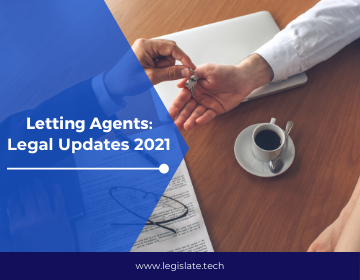The legal updates which impacted letting agents the most in 2021
18 August 2021 5703 Views

How up to date is your knowledge on notice periods, pets in rentals, electrical safety inspections and lodgers? This year we’ve all had to adapt to significant changes and with the home at the very heart of our new lives, letting agents have had to embrace changes to the ways they operate from how to contract with new tenants to how they can serve notices. Struggling to keep up with all these legal changes? More importantly, are your contracts up to date with these changes? Are you concerned about the safety of creating and signing physical contracts with new tenants?
Navigating Legal updates with Legislate
Legislate allows landlords and letting agents to effortlessly create, sign and manage tenancy related contracts and documents digitally. Moreover, Legislate keeps on top of all the legal updates to ensure its contracts are up to date and has compiled guidance on what they’ve encountered to be the most questioned areas of law. Below, Legislate discusses what they have found to be the most questioned parts regarding the law affecting lettings this year.
1. Pets
The government updated its Model Tenancy Agreement in January 2021 which the press were quick to read into. The tenancy agreement included a clause stating that a landlord should only turn down a request from a tenant to keep pets in the property where there is a good reason for doing so, perhaps due to the size of the vicinity.
People were quick to report that this meant that landlords were legally required to permit tenants to keep pets in their properties where it was reasonable to do so.
This is not the case, there is a sharp distinction between ‘guidance’ and ‘law and the Model Tenancy Agreement clearly sits in the former category. As a ‘model’ agreement, the amendments to the Model Tenancy Agreement have not created new laws or obligations. Landlords and letting agents can continue to operate their ‘no pets’ policies, provided they ensure that they do not increase the deposit for the property past the 5 week’s rent maximum and, in the case of service dogs, they do not breach the UK’s equality laws2
2. Notices
Section 8 and 21 notice can be used to evict tenants who have an assured shorthold tenancy (AST), the default residential tenancy in England and Wales. A section 8 notice is typically used when tenants are in breach of their tenancy agreement and can be served under 17 grounds although not all concern instances where the tenant has been at fault. The notice period required depends on the ground on which the landlord or letting agent is relying on.
A section 21 notice is a notice for possession and can be served at the end of a fixed term tenancy or during a periodic tenancy.
If a section 8 or 21 notice was given before 26th March 2020, a tenant was entitled to 2 months notice (depending on the ground of eviction).
However, as all letting agents are aware, Coronavirus has impacted notice periods. Under current Coronavirus legislation, for section 8 and section 21 notices served in England:
-
Between 26th March to 28th August 2020, you must give at least 3 months notice;
-
Between 29th August 2020 and 31 May 2021, you must give at least 6 months notice, and;
-
On and from the 1st June 2021, you must give at least 4 months notice.
For evictions involving anti-social behaviour, these notice periods may be shorter.
In Wales, notices given from the 24th July 2020 must be at least 6 months for both section 8 and 21 notices. If a tenant is being evicted for anti-social behaviour this period can be shortened but it must still be longer than 3 months.
For ‘contractual’ periodic tenancies, you must give notice that is as long as the rental period. For example, if the tenant pays rent every 2 months, you must give them 2 months notice. In Wales, tenants are entitled to stay for the notice period, plus any additional time that their final rent payment covers.
3. Electrical inspections
Prior to April 2020, HMOs were the only private tenancies where landlords and letting agents were required to carry out electrical safety inspections. However, following the Electrical Safety Standards in the Private Rented Sector (England) Regulations 2020 all new tenancies from 1 July 2020 and all existing tenancies in England as of 1 April 2021 must carry out an Electrical Installation Condition Report (EICR). The EICR must detail any damage, defects or dangerous conditions present. If the property is considered unsafe, the report will be marked as ‘unsatisfactory’ and remedial action must be completed within 28 days, unless the report specifies an earlier fix. Landlords and letting agents are required to provide existing tenants with copies of the report within 28 days of the inspection. Inspections should be carried out at regular intervals. Unless a report specifies otherwise, regular intervals are considered to be every 5 years.
Exceptions to the EICR requirements are found in Schedule 1 of the Regulations and include student halls and lodgers.
4. Lodgers
Lodgers differ from your typical tenants- they’re a licensee who can only stay in the property as long as the landlord allows them. As such, rights and obligations under lodger agreements can be complicated.
For lodgers, there are different notice periods. If they are excluded occupiers, lodgers only need to receive ‘reasonable notice’- typically the length of the rental period- that does not have to be in writing. For example, if your lodger pays rent every 2 weeks, a 2 week notice period is reasonable. If the lodger is an occupier with basic protection, they must receive written notice, typically of 4 weeks, but this will ultimately depend on your agreement. Unlike where you have an excluded occupier and you can simply change the locks, to end a non-excluded tenancy or licence you must get a court order to evict them.
Different rules also apply to lodgers in regards to electrical safety inspections. As noted above, a letting agent or landlord does not need to provide a lodger with an EICR.

How to create a contract with Legislate
Landlords and letting agents simply need to fill in responses to questions asked on the platform for a valid and up to date legal contract to be automatically generated. Using their email address, tenants can be invited to review the contract and sign directly in Legislate. Tenants ask fewer questions because Legislate contracts are easy-to-understand and have explanations for key clauses. The platform’s patented technology provides key insights into a user’s contracts, making contract management easier than ever.
Video link and thumbnail: https://www.youtube.com/watch?v=Nl1uRjrczYE

Legislate’s members say that they save about three hours per contract and that they think it sets a good impression with their future tenants. Contracts can be easily located, at the touch of a button, and members have confidence that their contracts are up to date and in line with the current law.
Finally, one Legislate member noticed the number of tenant requests for a contract copy dropped by 90% as tenants can now access their documents from their own Legislate vault at any time during and after their tenancy.
To join over 1000 members who trust Legislate to create their own contracts, visit our website, book a demo or get in touch with our team.
About Legislate
Legislate is an easy-to-use online software platform which helps landlords and letting agents create, sign and manage lawyer-approved legal documents by themselves. Launched in 2020, Legislate’s team marries technical and legal expertise to create a painless, smart contracting experience for its members.



